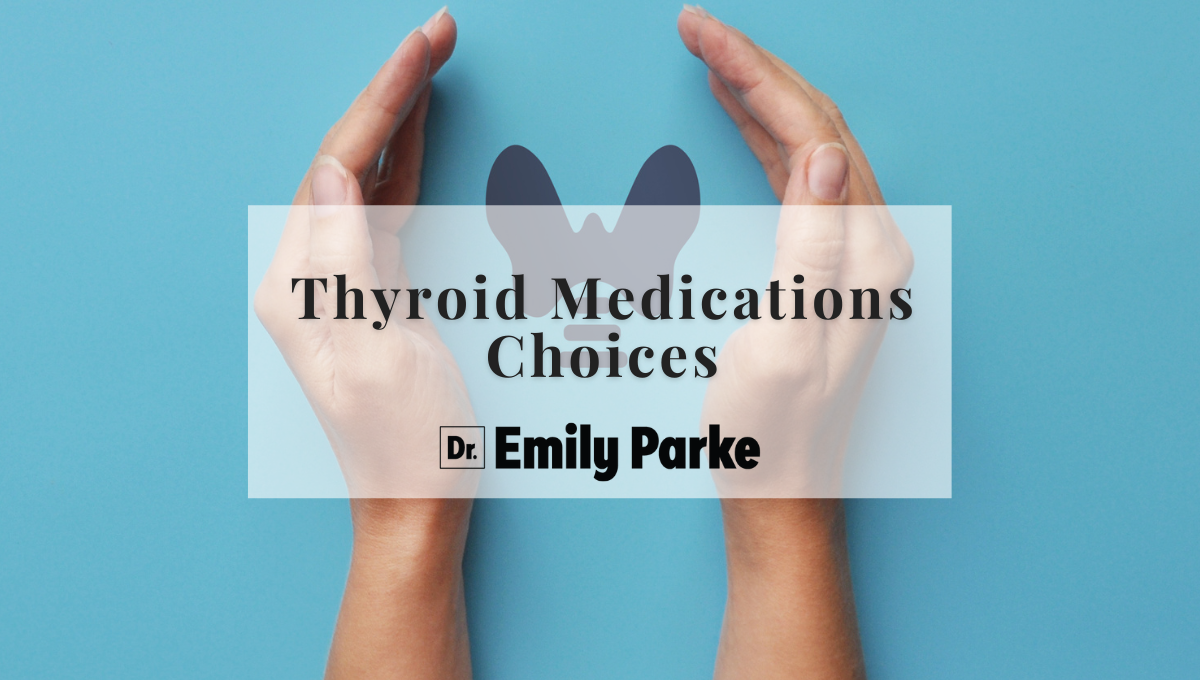

Hi, this is Dr. Emily Parke with your next Functional Health Minute. I’d just like to review different types of thyroid medications with you because these are questions I get all the time. I have patients come in who are newly diagnosed with hypothyroidism, and also patients who have been diagnosed with Hashimoto’s thyroiditis and or hypothyroidism in general for many years and have been taking thyroid medications and want to know what the different options are. So the traditional standard prescription for thyroid medication is Levothyroxine. That is the generic for Synthroid. Synthroid is the original brand name for Levothyroxine. So Synthroid can be prescribed, generic Levothyroxine can be prescribed. There is another medication called Tirosint that is also Levothyroxine based. The difference between all of these is the following. Tirosint comes in two different forms. It comes in a liquid squeezable form that is pure Levothyroxine and glycerin. There are no additives, there’s nothing else in it.
Levothyroxine Based Medications
The liquid form gets absorbed really rapidly because it doesn’t have to go through your digestive tract at all. So it’s really effective for those that have gut issues. I like to prescribe that. The Tirosint gels that come are also very clean. It’s just a clear gel capsule with the liquid inside. Again, no additives and much better absorption than the traditional Levothyroxine generic or Synthroid. The generic Levothyroxine and Synthroid typically have some additives in it, and depending on which manufacturer the generics come from, will depend on what it has in it. Does it have extra dyes in it? Does it have talc? Does it have gluten? Does it have lactose in it? Most patients do fine with those unless you are extremely intolerant to any of those ingredients. But in general, especially if you are a Hashimoto’s person or someone that has autoimmune disease in general, I do like to avoid adding gluten especially.
So being on one of the other cleaner Levothyroxine versions is definitely beneficial for a lot of people. So the other form of thyroid medication that’s really popular are the natural desiccated thyroid hormones. So these are things like Armour, NP Thyroid, Nature Throid. There used to be one called West Throid. These are all natural desiccated thyroid, as I mentioned, that come from porcine gland, essentially pig thyroid gland. Now, these are different because it has Levothyroxine and Liothyronine in it, so T4 and T3. But because it comes from a natural gland, it actually has other parts of the thyroid in it, like for example, T2. And that can make a difference in how a thyroid patient feels.
When to Combine Thyroid Medications
When to prescribe each of the different kinds. Well, I have patients on all kinds of thyroid medications and patients are doing well on a variety of things. So it’s not to say that, oh, every patient feels better on a natural desiccated thyroid that has T4 and T3 in it. It’s also not to say that patients should only ever be on T4 only medications. And there are also patients who I have on a T4 prescription like Tirosint for example. And we also prescribe separate Liothyronine, and that’s because when we do that, we can vary the dosages of each one. So I can say, you know what? I want to do 100 micrograms of Levothyroxine and I only want five micrograms of Liothyronine thyroid. If we use a natural desiccated thyroid hormone, then we’re married to the specific dose of T4 and T3 that come in the natural desiccated thyroid hormone.
There’s another option out there, and that involves compounding thyroid medication at a compounded pharmacy. That allows me to say exactly what I want in it. I can say I want “X” micrograms of T4, which is Levothyroxine, “X” micrograms of T3, Liothyronine in there. And I can say things like, please do not formulate with any additives or dyes or gluten, dairy, et cetera. So we can get really specific with the compounded thyroid medication, and we can say whether we want it immediate release or a sustained release. I do have some patients that do better with a more sustained release T3. Now the difference, and that’s because T3 or Liothyronine has a pretty short half-life. We’re talking about hours versus T4 Levothyroxine has a half-life of about seven days, so some patients do better on different formulations. I just wanted to kind of review them all because there are so many options out there.
And I also want to just impress upon you guys that it’s different for everyone. I have patients doing well on every single formulation that I just mentioned. It just depends on what your laboratory findings look like and how you feel. And I do think that the best way to overall manage thyroid medication is not to be completely married to a specific lab value or to exactly how someone feels. You have to combine both of them, and that’s because a lot of symptoms of hypothyroidism or hyperthyroidism can be caused by other factors. So you want to make sure you’re looking at all of the root causes and not just thinking that everything may possibly be thyroid related. This is Dr. Emily Parke with your Functional Health Minute.
Share:
Dr. Emily Parke
Social Media
Most Popular Posts
Subscribe To Our Newsletter
Related Posts

How Fructose Intake Affects Metabolic Health: What You Need to Know
Fructose, found naturally in fruits and added to processed foods as high fructose corn syrup, impacts health. Learn the metabolic effects of fructose intake.

Get More Vitamin D for Better Health!
Of all the vitamins and minerals you should be sure you’re getting enough of, vitamin D is perhaps one of the most important. The benefits of vitamin D are widespread and pretty incredible.

The Science Behind Protein: The Optimal Amount of Protein in the Diet Based on Age and Activity Level
Different amounts of protein are needed at different stages of life. Learn about protein, how much you need, and what happens when you don’t get enough.

Magnesium: The Essential Mineral, Its Role in the Body, and What to Know About Magnesium Supplements
Learn about the mineral magnesium, its role in the body, how to spot magnesium deficiency, and the most bioavailable forms of magnesium to supplement with.
